
See what's inside!
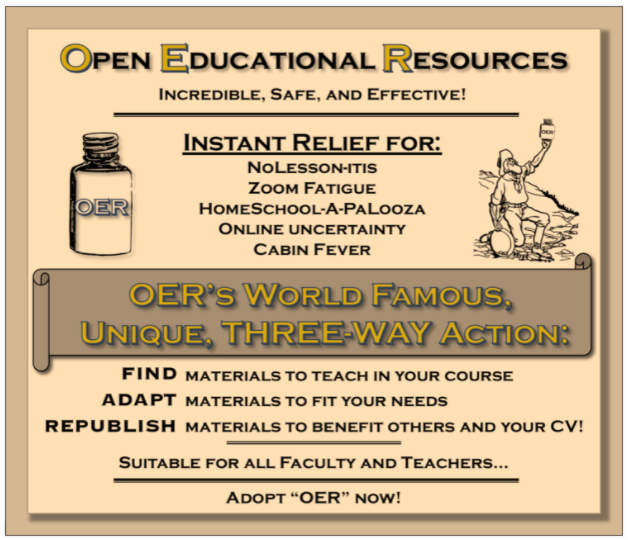
Open Educational Resources: Incredible, Safe and Effective? Experts Weigh In
Open Educational Resources are not a cure-all, but they can help meet many instructional challenges.
Are you hunting for student-centered biology lessons? Browse QUBESHub's ~1400 open educational resources.
Not sure whether your course will be online or in-person? Or looking for a pretty specific kind of lesson? Search a user-created, metadata-rich spreadsheet of OER materials suitable or adaptable for online learning,
- Sortable by topic, student activity, faculty preparation, etc.
- Many materials can work online or in-person.
- Plan a flexible syllabus of activities.
- Contribute! Add to, edit, correct, and improve this user-driven resource!
Do you need professional contributions in teaching for your tenure packet or annual review? Would you like to be someone's hero?
Contribute your lesson suitable for online instruction as an Open Educational Resource and save someone's day!
Utility, not perfection, is the standard. Your "This is nothing special...; might be someone else's "OMG! This is just what I need!"
New QUBES Feature: Creating a Personal Collection of QUBES Resources
Collections are an easy way to save and organize your favorite QUBES resources. To add a resource to a collection, go to the resource record and click the “Collect” button that is located in the top right corner of the page. There are more details on collecting resources in the Knowledge Base Article: Creating a Personal Collection of QUBES Resources.
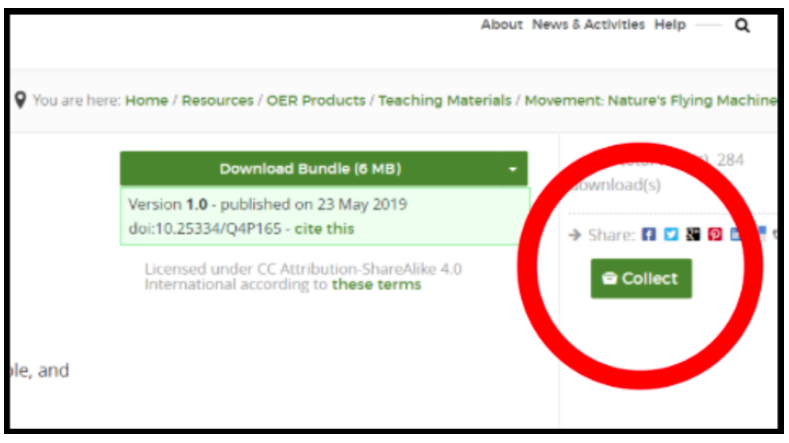
You can view collections from any public group or group you belong to by clicking on “Collections” in the menu that appears on the left side of the screen. For example, see this collection composed entirely of resources from the Teaching Quantitative Biology Online group.
ShutDownSTEM
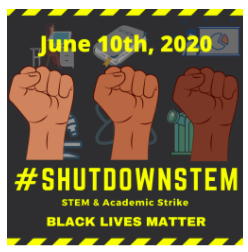 #ShutDownSTEM has a pledge and a starter list of ways to get involved. We will be using the QUBES social media and platform to promote resources and partners. We also invite the community to discuss the challenges ahead in our Open Communities, such as BUILDS and Teaching Quantitative Biology Online. To create meaningful change moving forward, we need to work together, and we are here to help, and here to learn from others. #ShutDownSTEM has a pledge and a starter list of ways to get involved. We will be using the QUBES social media and platform to promote resources and partners. We also invite the community to discuss the challenges ahead in our Open Communities, such as BUILDS and Teaching Quantitative Biology Online. To create meaningful change moving forward, we need to work together, and we are here to help, and here to learn from others.
See the full QUBES post here.

Dismantling Racial Oppression
Presenter: Kelisa Wing
Please join us on June 17, at 3:00 pm ET. Learn more at this site and sign up to join.
Presenter: Kelisa Wing, Professional Development Specialist at Department of Defense Education Activity (DoDEA)
Topic: This episode will build from Kelisa Wing's recent blog post calling for educators to hold themselves accountable for dismantling racial oppression. There is unmet potential for educators to teach tolerance, ensure representation, and disrupt the system of oppression for our students and colleagues. Kelisa will provide specific, actionable ways educators can make a difference in the lives of the students they serve.
Speaker Bio: Kelisa Wing is the author of "Weeds & Seeds: How To Stay Positive in the Midst of Life’s Storms" and "Promises and Possibilities: Dismantling the School to Prison Pipeline" (both available on Amazon). She also is a 2017 State Teacher of the year, speaker, teacher and activist for discipline reform. Kelisa has collaborated with 100Kin10 to develop frameworks for retaining teacher leaders in STEM education for the past two years.
EDSIN, B(ui)LDS, BLUE, and iDigBio are organizing a new webinar series,“Inclusive Teaching Practices in STEM Education,” to initiate discussion on topics related to inclusive teaching practices while building community among a diversity of STEM disciplines interested in creating more inclusive learning environments for undergraduate students.
Project partners represent different communities in the world of STEM, but are all interested in fostering more diverse and inclusive communities. Join us as we raise awareness of the existing knowledge base and resources.
Become a BIOME Fellow! The Biology and Mathematics Educators (BIOME) Institute 2020
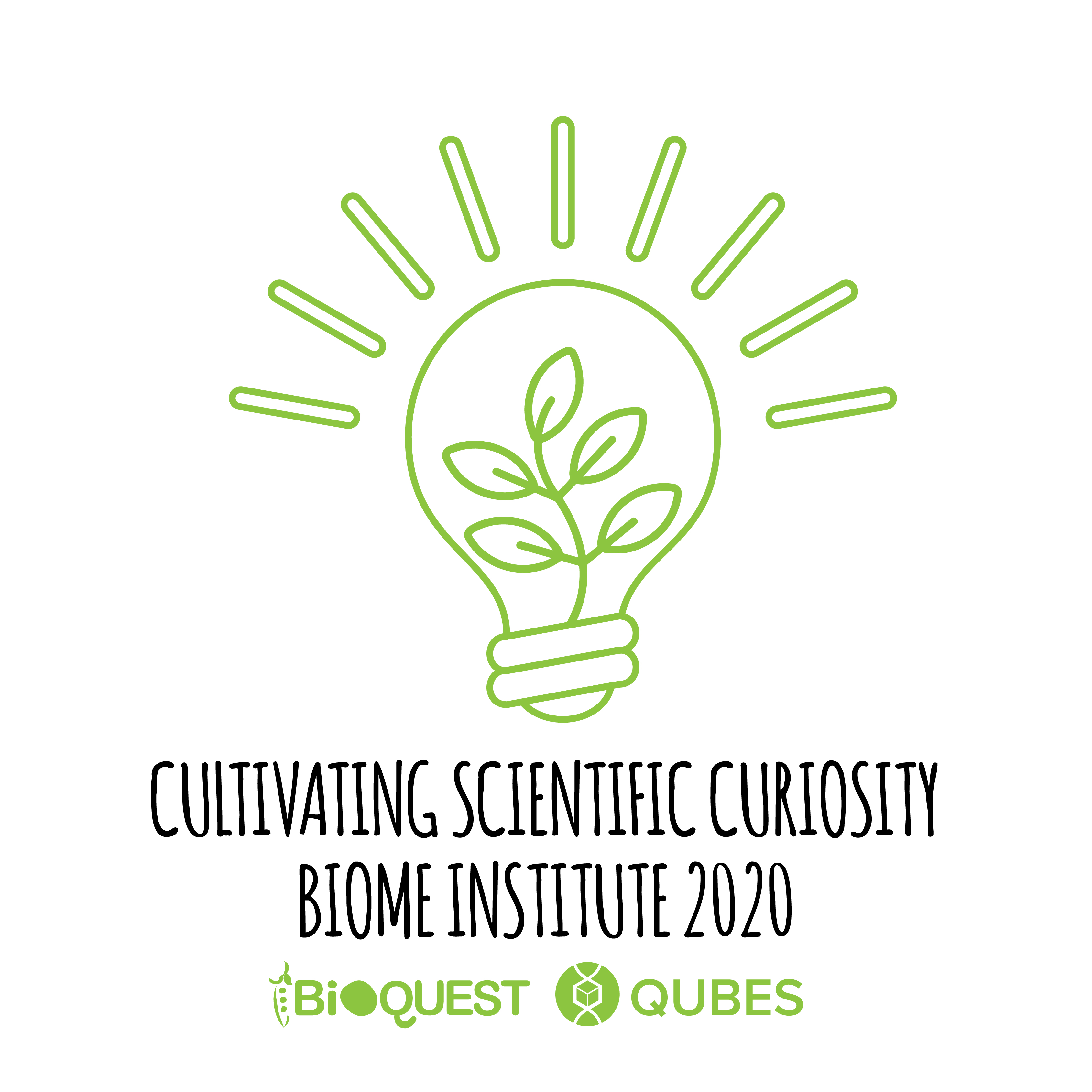
Applications due June 15.
Become a BIOME Fellow! BioQUEST and QUBES are offering the BIOME Institute, an online, sustained, community-based professional development experience to support faculty developing, implementing, or expanding UREs, both in person and online. The 2020 Institute includes
Summer (Jul 27-Aug 7): A summer launch to explore multiple models of successful UREs, learn about resources and educational practices appropriate for UREs, and initiate collaborations.
Fall (Sep 7-Nov 20): Facilitated Institute Working Groups will continue to examine critical pedagogical aspects of UREs, and offer peer support during development of plans for piloting or expanding URE programs with a goal of generating well designed implementation plans.
Details
- Scholarships to substantially defray participation costs are available.
- Most synchronous activities (talks or workshop sessions) will be recorded to accommodate varied schedules.
- Fall Working Groups will select times that are convenient for all members to meet.
- Individuals from all biological disciplines, as well as quantitative, physical and social sciences are welcome to apply.
- Disciplinary and interdisciplinary institutional teams are encouraged to apply.
- Future faculty are especially welcome to apply and are encouraged to partner with a faculty member at their institution.
For more information, visit the BIOME Institute website.
Society for Mathematical Biology Announces Recipients of its 2021 Awards for Established Scientists
QUBES wants to join the Society for Mathematical Biology in celebrating Carrie Diaz Eaton, a recipient of the 2021 Awards for established mathematical biologists!
Carrie Diaz Eaton, Bates College, will be the recipient of the John Jungck Prize for Excellence in Education. Dr. Eaton has been chosen based on her extensive work in Math Biology including, but not limited to, her creation of QUBES, exceptional mentoring of students and trainees, use of undergraduates in research, and co-editing of a book on education in math biology. This Prize is given for significant contributions to education in mathematical biology, including a distinguished record of excellence in classroom instruction, mentorship of students, development of novel educational methods, materials, and programs, promotion of scientific outreach, a track record of attracting new students to the field of mathematical biology, and creation of an environment exceptionally conducive to education in mathematical biology. Dr. Eaton who will give a talk at the annual meeting of the Society in Riverside in 2021.
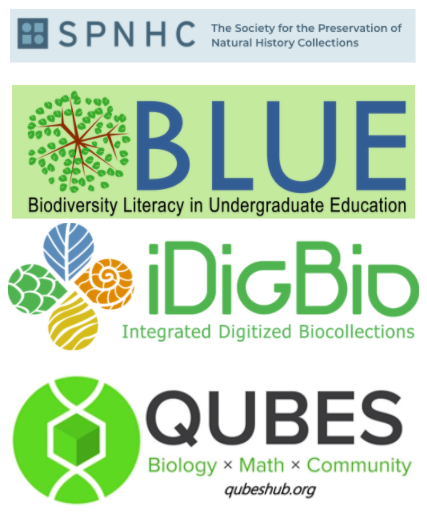
2020 Virtual Educational Share Fair
Thursday, June 11, 2:30pm UTC
For the third year in a row, SPNHC, iDigBio (Integrated Digitized Biocollections), BLUE (Biodiversity Literacy in Undergraduate Literacy), and QUBES (Quantitative Undergraduate Biology Education and Synthesis) are excited to offer the Educational Materials Share Session.
This session offers colleagues the opportunity to present collections-based education or outreach materials, to provide feedback as potential adopters, and to build collaborations between their different institutions. Materials at any stage of development from fledgling ideas to fully vetted activities take the center stage for discussion. We welcome all conference attendees to participate either as content presenters or reviewers. The Educational Materials Round Table concept evolved from the successful model created by Teresa Mourad from the Ecological Society of America.
The format will be a two hour Zoom session, planning to utilize Zoom breakout rooms. Each presenter will be assigned to a breakout room for a designated amount of time to discuss their materials with participants. When not presenting, participants will be able, and encouraged, to give feedback in other sections. Materials from each presenter have been made available ahead of time through QUBESHub.
Your Input Needed: Impact of Remote Teaching on Faculty
How has the COVID face-to-face remote learning transition impacted faculty? Bryan Dewsbury at URI is leading this data collection effort. If you have approximately 10 minutes towards this initiative, please follow this SurveyMonkey link and consider sharing with colleagues who may be interested.
Participants Needed: Validating Survey Instrument
Consider participating in a research study that seeks to validate a survey instrument designed to measure post-secondary science instructors' epistemic approach to teaching science.
We are seeking biology, ecology, or geology faculty to complete this 25-30-minute survey, which presents several classroom scenarios and asks how you would respond to each. To thank you for your time completing the survey, at the end of the survey you will have the option of entering a drawing for one of three $100 prizes that will be distributed. To begin your participation, please follow this link to the survey at Illinois State. Questions? Tanya Josek, tjosek@ilstu.edu.

CourseSource: Share Your Innovative Online Lessons
Colleges and Universities are scrambling to adapt to teaching remotely. There is a great need for high quality, vetted life science instructional materials that can be taught in an online format. CourseSource is eager to help fill this pressing need (Learn More Here). If you have developed materials for online or remote instruction, we encourage you to click here to submit them to CourseSource. Due to the pressing need, we will expedite the review and revision processes for such submissions.
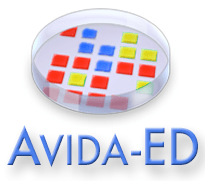
6th Active LENS Workshop: Summer 2020
Wednesday, July 1, 2020, 1-6pm EST
Registration deadline: June 15. Application here. Late applications considered, space permitting.
The 6th annual Avida-ED Active LENS Workshop will be held July 1-2, 2020 as an online event. The Active LENS workshop aims to train instructors in the use of the Avida-ED software package, developed to help students learn about evolution and the nature of science, so that workshop participants can both implement classroom interventions using this software and also train other educators.
Workshop participants will join a growing community of educators using digital evolution to let their students directly observe evolutionary processes through inquiry-based exercises that advance reform-oriented active learning.
Follow this link to the application form for the Active LENS Workshop, and registration for the course is $50. Note that participants who complete the course will receive a certificate and a refund of the course fee. Questions? Diane Blackwood blackwo5@msu.edu
About Avida-ED. Avida is a digital evolution software platform used to study evolutionary processes, and harness evolution to solve engineering problems. Avida-ED is a free, browser-based, user-friendly version of Avida developed specifically for educational purposes, with a graphical user interface and visualizations that allow the user to observe evolution in action. (See here for more information and to run the software in your web browser.) Avida-ED has been developed for undergraduates and advanced placement high school students to learn about the nature of science and evolution in particular. Users have significant control of the environment and are able to change parameters such as the world size, the mutation rate, and what resources are available. Individual organisms can be saved in a virtual freezer, analyzed individually to watch how they perform tasks and replicate themselves, and used to start new evolutionary runs. Because digital organisms grow and divide much faster than even the fastest microbes, Avida-ED allows users to test evolutionary hypotheses over the course of hours or minutes. By generating hypotheses, collecting data, and analyzing results, users will gain experience not just with concepts in evolution, but with the nature and practice of science as a whole.
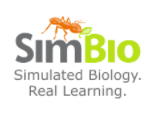
SimBio Extends Open Resources Through Fall
How Diseases Spread: Epidemiology Explored: FREE through FALL.
SimBio developed their popular virtual lab exploring disease spread long before the current pandemic, but it has direct applications to COVID-19. Given the current uncertainty about how and when undergraduate institutions will return to traditional in-class teaching, SimBio is extending their free offer to college instructors who would like to teach with this module through FALL term. Visit https://simbio.com/promos/how-diseases-spread to learn more.
Other Remote Teaching Resources from SimBio. For current information about other offers and options from SimBio during the pandemic, SimBio has posted a Remote Teaching Offers website page. This page also provides more information on the webinars listed below.
SimBio Webinars. SimBio is continuing to offer webinars each week.
POSITIONS: Teaching Postdoctoral Scholar at NCSU
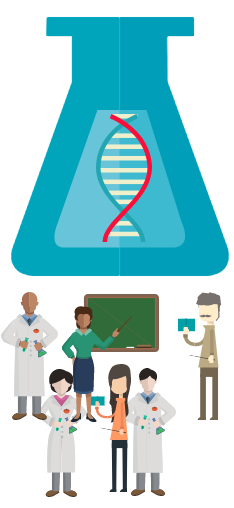 The Biotechnology Teaching Program (BIT) at North Carolina State University invites applications for a position as Teaching Postdoctoral Scholar in the area of molecular biology and/or chemical biology. Responsibilities will include teaching sections at the graduate and undergraduate levels of an existing course that explores manipulation and expression of recombinant DNA and developing and implementing a new laboratory course in a cutting-edge area of molecular biotechnology in the scholar's area of expertise. With a new NIH-funded initiative to promote Molecular Biology Laboratory Education Modules (MBLEMs) across the country, there are exciting opportunities to create, disseminate, and assess educational modules. Furthermore, scholars will mentor undergraduate research students in independent research projects. The successful candidate must have strong interpersonal skills and teaching ability. A Ph.D. in molecular biology or a related field is required, and postdoctoral research experience is strongly preferred. This is a 12-month position, and is renewable for up to three years, based on performance and funding. The position is available starting in August 2020. The Biotechnology Teaching Program (BIT) at North Carolina State University invites applications for a position as Teaching Postdoctoral Scholar in the area of molecular biology and/or chemical biology. Responsibilities will include teaching sections at the graduate and undergraduate levels of an existing course that explores manipulation and expression of recombinant DNA and developing and implementing a new laboratory course in a cutting-edge area of molecular biotechnology in the scholar's area of expertise. With a new NIH-funded initiative to promote Molecular Biology Laboratory Education Modules (MBLEMs) across the country, there are exciting opportunities to create, disseminate, and assess educational modules. Furthermore, scholars will mentor undergraduate research students in independent research projects. The successful candidate must have strong interpersonal skills and teaching ability. A Ph.D. in molecular biology or a related field is required, and postdoctoral research experience is strongly preferred. This is a 12-month position, and is renewable for up to three years, based on performance and funding. The position is available starting in August 2020.
For further information or to apply, go to https://jobs.ncsu.edu and search for position number 00107915. Applications received prior to June 15, 2020, will be assured of full consideration. This position will remain open to applicants until filled. Questions? Dr. Carlos C. Goller ccgoller@ncsu.edu.
Members of the QUBES team are participating in some re-imagined conferences that will be happening through the QUBESHub. Members of the QUBES team are always looking to meet others who have a passion for quantitative biology education. Reach out so we can help you gather your collaborators, move projects forward, and continue to move quantitative biology forward. Connect with us by submitting a support ticket

From left to right: Sam Donovan (Director of OER), Carrie Diaz Eaton (Director of QUBES Consortium), Kristin Jenkins (Director of BioQUEST), Drew LaMar (Director of Cyberinfrastructure), and Jeremy Wojdak (Director of Professional Development).
Do you have a product or result from a QUBES sponsored activity? Help us measure our success by sharing your product or result with QUBES. Learn how to cite QUBES.
|